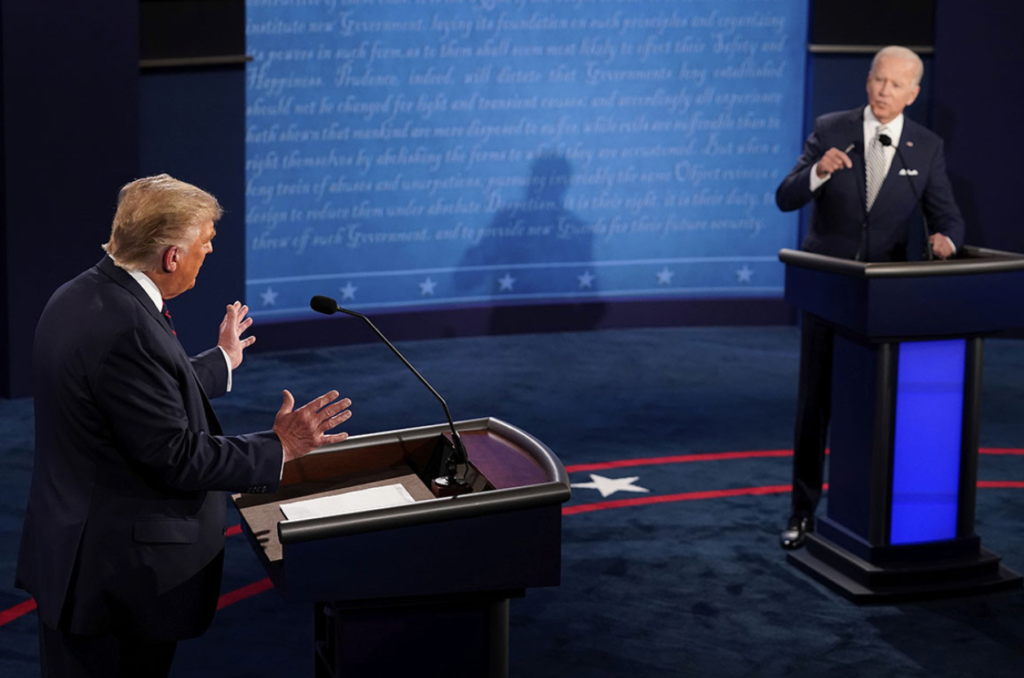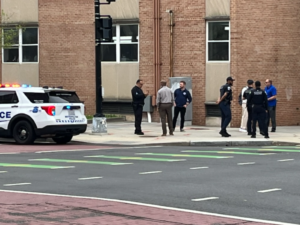The Final Curtain: Trump and Biden Offer Conflicting Perspectives In Final Debate Marked by Great Dissension

Image Courtesy of Politico
By Justin Lamoureux
They stood just meters apart on the stage, each man detailing his vision for America (coupled with scathing grievances toward the other) as if the very fate of democracy might depend on it. Neither minced words: One mounted the pedestal with his trademark bluntness, defending his own record to the bitter end while striving to draw blood around every corner. The other tried desperately to position himself above the fray, hoping to provide consolation to his television audience while outlining an alternative path for a deeply tarnished country. Civility would come to define this spectacle, but in truth, it reflected nothing but a shallow pretense.
Compared to the exceptionally chaotic first debate between President Trump and former Vice President Joe Biden, this was a relatively cordial affair. Nonetheless, the evening commenced with a highly charged topic: The COVID-19 pandemic. It did not take long for the conversation to become heated: Biden warned that America is “going into a dark winter,” and posited that the Trump Administration “has no comprehensive plan” for responding to the virus. President Trump, meanwhile, claimed that his administration plans to have a vaccine ready “within weeks,” and that it will be distributed “very quickly.” The Democratic nominee immediately repudiated this, saying that a vaccine likely won’t be available to a majority of Americans “until the middle of next year.”
The president continued to defend his response to the crisis. He contended that his administration is currently addressing the task of “opening up the country,” and that ordinary people are “learning to live with [the virus].” Trump cited decreasing spikes in states like Florida, Arizona, and Texas (which, throughout the summer, had experienced a multitude of outbreaks) as evidence that his approach has been effective.
Biden fired back that “people are learning to die with it,” acknowledging the deeply personal toll that COVID-19 related deaths have taken on thousands of families across the country. The former vice president drew on imagery that anyone who has experienced such grief can relate to,such as an “empty chair at the kitchen table,” to emphasize this message.
Later, when the focus of the debate shifted to American families (specifically, the recent development that federal officials are struggling to locate the parents of 545 children separated at the border), it did not take long for the dialogue to become exceedingly tense. President Trump said his administration is trying “very hard” to locate said parents, but maintained that “a lot of kids… come over through cartels and through coyotes and through gangs.”
Notwithstanding the delicate nature of this issue, Biden made no attempt to conceal his disgust with the president’s viewpoint. “Coyotes didn’t bring them over,” he responded, his voice trembling with rage. “Their parents were with them. They got separated from their parents. And it makes us a laughingstock and violates every notion of who we are as a nation.” Attempting to cast blame on his opponent, Trump asserted that the Obama Administration “built the cages” when Joe Biden was serving as vice president.
Every issue covered during the debate was marked by harsh diatribes, but none grew as contentious as the discussion of race in America. Biden alleged that Trump “pours fuel on every racist fire,” underscoring the president’s past refusal to condemn white supremacy.
Trump, meanwhile, tried to position himself as a trendsetter on the issue, arguing that he has “done more for the black community than any president” since Abraham Lincoln, and that he was “the least racist person” in the room. It should be noted that Kristen Welker, who moderated the debate, is biracial.
The president went on to accuse Biden, and former President Barack Obama, of ignoring issues pertaining to racial justice, taking particular issue with Biden’s support for a 1994 crime bill which Trump believes “did such harm to the Black community.” Biden defended his record on race by reminding his opponent that he’s been trying to change drug sentencing laws that disproportionately harmed African Americans, and stressing that the public knows his record. Biden has called the aforementioned law a mistake in the past, and he reiterated that Thursday. “The fact is, there is institutional racism in America,” the former vice president concluded.
Biden also made strides with his solutions for climate change. The Democrat emphasized his desire to see the country “transition away from the oil industry,” stressing that oil “has to be replaced by renewable energy over time.” Part of his strategy in doing so, he insisted, would be to stop giving them federal subsidies.
Unsurprisingly, Trump countered with allegations that Biden seeks to “destroy the oil industry,” and urged supporters in key battleground states to keep that in mind. “Will you remember that, Texas?” the president pondered. “Will you remember that, Pennsylvania, Oklahoma, Ohio?”
In addition to focusing on policy issues, the two candidates devoted considerable time to scrutinizing each other’s ethical decorum. Trump chastised Biden over his son, Hunter’s business dealings in Ukraine. This related primarily to allegations that a laptop belonging to Hunter with unverified emails suggesting that Biden, while vice president, met with his son’s Ukrainian business associate, and that Biden was slated to receive a cut of another business venture in China after he left office.
“I have not taken a penny from any foreign source ever in my life,” Biden shot back. “Nothing was unethical.” The Democratic nominee added that during President Trump’s impeachment proceedings, everyone who testified (under oath) on his behalf affirmed that Biden “carried out U.S. policy,” and “did [his] job impeccably.”
Another topic of contention was that of recent claims that President Trump has a bank account in China. He dismissed such conduct as a transactional matter, saying that he “was a businessman doing business.” Biden also emphasized that, while he has released 22 years’ worth of his own tax returns, Trump has released none.
Thursday night’s agenda also included talks about healthcare. Trump asserted that Biden “wants socialized medicine,” and that “this whole country will come down” if such a policy is implemented. The president,and many Republicans, have frequently attempted to connect medicare-for-all propositions with all Democrats. Conversely, Biden does not support Medicare for All; rather, he favors implementing a so-called “Public Option,” which is similar to Medicare, but would be available on ACA exchanges. The former vice president has explicitly stated on numerous occasions that he would not ban private insurance.
“We have 180 million people out there that have great private health care — far more than what we’re talking about with Obamacare,” Trump said of Biden’s plan, going on to falsely claim that Biden’s proposal would “terminate 180 million plans.”
“He’s confused,” Biden said of Trump comparing him to other candidates in the Democratic primary who supported Medicare for All. “He thinks he’s running against someone else. He’s running against Joe Biden. I beat all those other people because I disagreed with [them] on healthcare.”
Naturally, each candidate blamed his opponent for not doing enough work on health care during their time in office. Trump claimed he had done more in 47 months in office than Biden did in 47 years, a talking point he’s made at several rallies in recent days. Biden, meanwhile, underscored that Trump has consistently tried to defund medicare.
So, who did a better job? Well, according to CNN, Biden did.Following the debate, a poll conducted by the news organization revealed that 53% of viewers thought the former vice president had won (compared to just 39% for Trump). For the president, however, this is a slight improvement over the first debate, in which a mere 28% of viewers regarded him as the winner.
In terms of how each candidate was perceived, though, the debate had very little impact. Biden’s favorability ratings held their own at 55%, increasing a single percentage point during post-debate interviews. President Trump’s approval rating was similarly stagnant at 42%, decreasing one percentage point following the debate.
Despite Trump’s performance in the debate posing little detriment to his approval rating itself, a majority of viewers, 55%, respectively, said his showing raised concerns about how he would handle the presidency. Only 41% reached the same conclusion about Biden.
While the specific numbers vary across demographics, Biden nevertheless surpassed Trump among both genders, all age groups, and potentially undecided voters (independents and moderate voters, who may be persuaded to support either candidate). From a policy standpoint, the only issue where Trump maintained an edge was the economy (56-44%). By a similar token, there was an important quality on which viewers were evenly split between him and Biden: On the subject of who seemed to be the stronger leader, each candidate was favored by 49% of viewers.
Traditionally, debates have represented a staple feature of any presidential campaign. Having a strong performance was viewed as critical to a candidate’s prospects, especially when it came to gaining support from voters who could find themselves on either side of the aisle. It goes without saying, however, that this campaign is anything but traditional.
With so many people having already cast their ballots and so few undecided voters (somewhere between 2 and 8 percent, according to a composite of recent polls) still on the cards, it would not be unreasonable to hypothesize that little could alter the trajectory of the race over the next several days. Don’t jump to conclusions, though. While the odds remain slim that said debate will prove to be a deciding factor in this election, one must keep in mind that this year has seen more twists and turns than San Francisco’s infamous Lombard Street. It’s been full of surprises, and there is no reason to believe that Election Night (and the days, if not weeks, that follow) won’t be the same.








